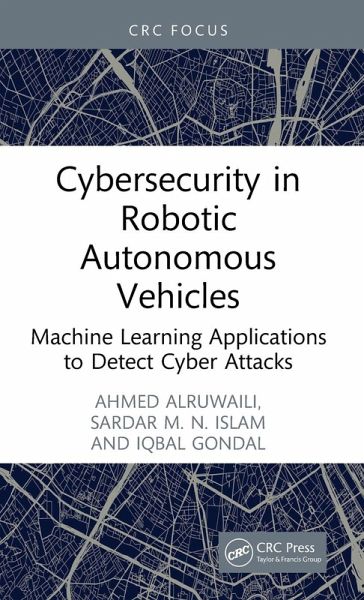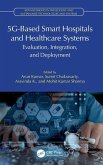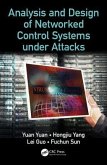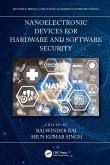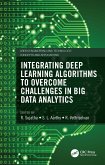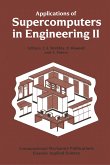Ahmed Alruwaili, Iqbal Gondal, Sardar M. N. Islam
Cybersecurity in Robotic Autonomous Vehicles
Machine Learning Applications to Detect Cyber Attacks
Ahmed Alruwaili, Iqbal Gondal, Sardar M. N. Islam
Cybersecurity in Robotic Autonomous Vehicles
Machine Learning Applications to Detect Cyber Attacks
- Gebundenes Buch
- Merkliste
- Auf die Merkliste
- Bewerten Bewerten
- Teilen
- Produkt teilen
- Produkterinnerung
- Produkterinnerung
Cybersecurity in Robotic Autonomous Vehicles introduces a novel Intrusion Detection System (IDS) specifically designed for AVs, which leverages data prioritization in CAN IDs to enhance threat detection and mitigation. It offers a pioneering intrusion detection model for AVs that uses machine and deep learning algorithms.
Andere Kunden interessierten sich auch für
![Designing Workforce Management Systems for Industry 4.0 Designing Workforce Management Systems for Industry 4.0]() Designing Workforce Management Systems for Industry 4.0180,99 €
Designing Workforce Management Systems for Industry 4.0180,99 €![Computational Methods in Science and Technology Computational Methods in Science and Technology]() Computational Methods in Science and Technology239,99 €
Computational Methods in Science and Technology239,99 €![5g-Based Smart Hospitals and Healthcare Systems 5g-Based Smart Hospitals and Healthcare Systems]() 5g-Based Smart Hospitals and Healthcare Systems171,99 €
5g-Based Smart Hospitals and Healthcare Systems171,99 €![Analysis and Design of Networked Control Systems under Attacks Analysis and Design of Networked Control Systems under Attacks]() Yuan YuanAnalysis and Design of Networked Control Systems under Attacks130,99 €
Yuan YuanAnalysis and Design of Networked Control Systems under Attacks130,99 €![Nanoelectronic Devices for Hardware and Software Security Nanoelectronic Devices for Hardware and Software Security]() Nanoelectronic Devices for Hardware and Software Security156,99 €
Nanoelectronic Devices for Hardware and Software Security156,99 €![Integrating Deep Learning Algorithms to Overcome Challenges in Big Data Analytics Integrating Deep Learning Algorithms to Overcome Challenges in Big Data Analytics]() Integrating Deep Learning Algorithms to Overcome Challenges in Big Data Analytics158,99 €
Integrating Deep Learning Algorithms to Overcome Challenges in Big Data Analytics158,99 €![Applications of Supercomputers in Engineering II Applications of Supercomputers in Engineering II]() C.A. Brebbia (ed.) / D. Howard / A. PetersApplications of Supercomputers in Engineering II41,99 €
C.A. Brebbia (ed.) / D. Howard / A. PetersApplications of Supercomputers in Engineering II41,99 €-
-
-
Cybersecurity in Robotic Autonomous Vehicles introduces a novel Intrusion Detection System (IDS) specifically designed for AVs, which leverages data prioritization in CAN IDs to enhance threat detection and mitigation. It offers a pioneering intrusion detection model for AVs that uses machine and deep learning algorithms.
Hinweis: Dieser Artikel kann nur an eine deutsche Lieferadresse ausgeliefert werden.
Hinweis: Dieser Artikel kann nur an eine deutsche Lieferadresse ausgeliefert werden.
Produktdetails
- Produktdetails
- Verlag: Taylor & Francis Ltd
- Seitenzahl: 104
- Erscheinungstermin: 26. März 2025
- Englisch
- Abmessung: 216mm x 138mm
- ISBN-13: 9781041006404
- ISBN-10: 1041006403
- Artikelnr.: 72600418
- Herstellerkennzeichnung
- Libri GmbH
- Europaallee 1
- 36244 Bad Hersfeld
- gpsr@libri.de
- Verlag: Taylor & Francis Ltd
- Seitenzahl: 104
- Erscheinungstermin: 26. März 2025
- Englisch
- Abmessung: 216mm x 138mm
- ISBN-13: 9781041006404
- ISBN-10: 1041006403
- Artikelnr.: 72600418
- Herstellerkennzeichnung
- Libri GmbH
- Europaallee 1
- 36244 Bad Hersfeld
- gpsr@libri.de
Mr. Ahmed Alruwaili is a researcher specialising in Cyber Security, Artificial Intelligence, and Quantum Computing. He received his Bachelor of Computer Science in Computer Science and Information from Aljouf University, Saudi Arabia, in 2013, and a Master of Information Technology with a focus on Cyber Security from Deakin University, Australia, in 2019. Currently, he is pursuing his PhD at Victoria University, Australia, where he focuses on enhancing security frameworks for the Internet of Vehicles (IoV). His research bridges theoretical concepts and practical applications in areas such as Cyber Security, Artificial Intelligence, game theory, distributed systems security, machine autonomy, and quantum computing. An active member of the Institute for Systems and Technologies of Information, Control and Communication (INSTICC), and the Australian Information Security Association (AISA), Mr. Alruwaili is committed to contributing to the academic community and staying at the forefront of developments in his field. Dr. Sardar M. N. Islam (Naz) is currently a Professor at Victoria University, Australia. He is also a Distinguished Visiting Professor of Artificial Intelligence at UnSri and a Distinguished Visiting Professor of Quantum Technologies and Computing at BIT, Adjunct Professor of IT and Business at Armstrong Institute, Melbourne, and Editor-in-Chief of "International Transactions on Artificial Intelligence". Professor Islam adopts a global and humanistic approach in his research and academic works. He has published 31 scholarly authored academic books and 4 edited books with prestigious international publishers in different disciplines, including computer science. Professor Islam has also published approx. 250 articles, including some of the leading international journal articles in his specialised research areas. Dr. Iqbal Gondal is Associate Dean Cloud, Systems and Security and Deputy Director (Cybersecurity) Sir Lawrence Wackett Defence & Aerospace Centre (SLWDAC) in Royal Melbourne Institute of Technology (RMIT), Australia. He has worked in industry and academia for 25 years in both Singapore and Australia. He was the director of Internet Commerce Security Lab (ICSL) for seven years to conduct translational research in cybersecurity. Previously, he was the Director of ICT strategy for the faculty of IT in Monash, India. He is a Fellow of Institute of Engineers Australia, member of IEEE USA, and Graduate member of Australian Institute of Company Directors (GAICD). Dr. Gondal worked as a research fellow and a senior software systems engineer for seven years in Singapore and Australia with Delphi (GM), Singapore Manufacturing Technology (SimTech) centre and other industries working on design and development, project management, system design and integration, SCADA, intelligent techniques, adaptive systems, and wireless switches for financial services. He has published over 219-refereed conference and journal papers, and he is a an experienced HDR supervisor. Dr. Gondal was a member of the University Governing Council & Engineering Advisory Committee, Non-Exec Director of Oceania Cyber Security Centre, and University engagement for the Defence Science Institute.

